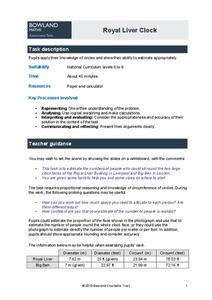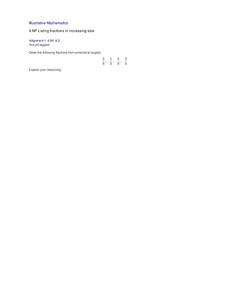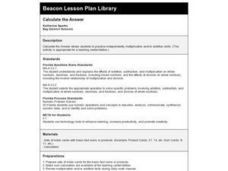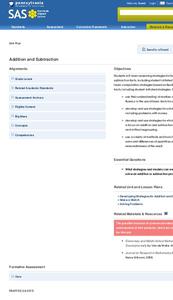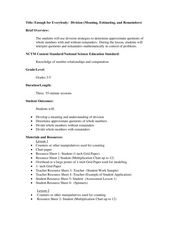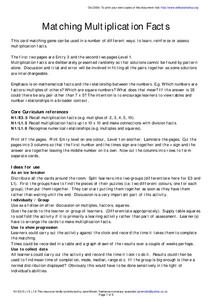Curated OER
Geometry Assessment-"Chapter 2"
In this geometry worksheet, learners match terms with definitions, and complete short answer questions about polygons and congruency.
PricewaterhouseCoopers
The Stock Market
Keep or sell? Young learners simulate as buyers in the stock market while learning about the benefits and important factors to know when purchasing. The thorough resource allows for observation of case studies and provides an assessment...
Curated OER
1st Grade Problem Solvers
First graders investigate, represent and solve problems using number facts, operations, and their properties. They solve on-step addition and subtraction number sentences and word problems using concrete materials. Students construct...
Bowland
Royal Liver Clock
Using clocks as dining tables? Scholars estimate the number of people that can sit around the face of the clock on the Royal Liver Building in Liverpool. They use estimation to justify their responses.
Curated OER
Relating Division and Subtraction
Third graders relate the process of division to subtracting equal groups. Through guided practice and teacher demonstration, they complete division problems using a subtraction method. Students complete problems independently for...
Curated OER
Problem Solvers
Fifth and sixth graders compare decimals to the place-value structure in the base-ten number system. They represent fractions as parts of unit wholes, as parts of a set, as locations on a number line, and as divisions of whole numbers....
Bowland
110 Years On
How many great, great grandchildren can one have? Scholars estimate the number of descendants a woman can have after 110 years. They use information about the average number of children per family and life expectancy to make this estimate.
Teach Engineering
The Great Gravity Escape
Groups simulate an orbit using a piece of string and a water balloon. Individuals spin in a circular path and calculate the balloon's velocity when the clothes pin can no longer hold onto the balloon.
Agriculture in the Classroom
A Rafter of Turkeys
How did that turkey get from the early Aztec culture to your table? Learn about the history of wild and domesticated turkeys in North America, as well as their inclusion in Thanksgiving traditions, with a two-part agricultural science...
Curated OER
Make a Match
Second graders examine the relationship between addition and subtraction. In this number sense instructional activity, 2nd graders practice their computation skills and use various strategies (including manipulatives and calculators) to...
Curated OER
Anchoring Activities - Various Subjects (K-5)
Teachers create different activities and differentiate them to meet the students' needs. In this differentiation lesson, teachers do activities such as accelerated reader, sunshine math, problem of the day, around the world or vocabulary...
Curated OER
Multiplication Movement
Third graders experience multiplication facts through movement and music. They view the Multiplication Rock video, choreograph a movement or dance to teach the multiplication facts of threes, and perform their dance.
Curated OER
Introducing Multiplication
Learners will look at repeating addition examples and view how they can be written as multiplication. They use manipulatives to complete a repeating addition lesson and show it on graph paper. They also chart what they have found and...
Curated OER
Calculating Sales Tax
Observe and demonstrate how to calculate state sales taxes. Learners create a sales tax chart by calculating the sales tax amount and tax inclusive retail price for school store items, then calculate the subtotals, sales tax amounts, and...
Illustrative Mathematics
Listing Fractions in Increasing Size
Increase the depth of your class's fractional number sense with this number-ordering activity. Given four fractions, each with different numerators and denominators, young learners are asked to place them in order from smallest to...
Federal Reserve Bank
So How Much Are You Really Paying for that Loan?
Loans are rarely provided without a cost. Pupils evaluate the high cost of using a payday loan or payday advance through discussion and worksheets, and finally work in groups to develop short public service announcements that outline the...
Curated OER
Yummy Gummy Subtraction
Here is a quick 15 minute lesson intended to introduce subtraction. Learners count and subtract gummy bears to complete 5 problems. The lessons suggest that the gummy bears can be saved and used the next day, but gummy bears get gross...
Curated OER
Teaching Reading Comprehension through Social Studies Readings
Examine how immigrants have changed the environment of the United States. Individually, middle schoolers will take a pre- and post-test to assess their reading comprehension. In groups, they compare and contrast the religions of...
Curated OER
What is Physical Fitness?
First graders explore and discuss what physical fitness actually is, its benefits and how to obtain it through a variety of ways. They summarize the five parts of physical fitness: cardiovascular endurance,muscular strength, muscular...
Pennsylvania Department of Education
Links Away: Looking Back and Moving Forward
Students explore fact families. In this math lesson, students use links to model a fact family. Students solve addition and subtraction problems.
Curated OER
Calculate the Answer
Students solve basic multiplication or addition facts using a calculator and product cards. They draw a card, read the sum or product, and press single digits on the calculator to display the number on the card.
Curated OER
Addition and Subtraction
Young scholars develop their own strategies to solve basic addition and subtraction facts. In this addition and subtraction lesson plan, students use strategies they already know and new ones to solve problems.
Curated OER
Enough for Everybody: Division
Students study division. In this math lesson, students arrange manipulatives into equal groups. Students discuss the relationship between multiplication and division.
Curated OER
Multiplication Flashcards
In this math learning exercise, students participate in a variety of math activities using multiplication flashcards. The multiplication cards range from numbers one through ten.





